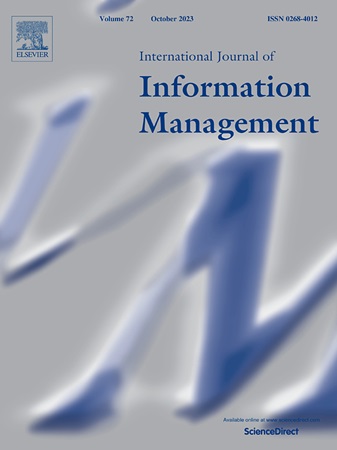设计人工智能以在服务恢复中获得积极的口碑:压力、拟人化和个人资源的作用
IF 27
1区 管理学
Q1 INFORMATION SCIENCE & LIBRARY SCIENCE
International Journal of Information Management
Pub Date : 2025-05-05
DOI:10.1016/j.ijinfomgt.2025.102916
引用次数: 0
摘要
服务组织越来越多地部署生成式人工智能(GenAI)聊天机器人来处理服务故障,但在理解拟人化人工智能设计如何改善服务恢复结果方面存在关键差距。本研究通过调查使人工智能代理更像人类是否可以减轻客户在服务恢复期间的压力并促进积极的口碑(pom)来解决这一差距。基于压力和应对的交易模型,我们提出人工智能交互中的拟人化提示可以降低客户对服务失败的压力评估。采用多研究实验设计,包括一个先导研究和三个基于场景的实验,操纵人工智能拟人化和服务故障严重程度。结果表明,人格化人工智能显著降低了客户压力水平,进而增加了pom,压力评估中介了人工智能人格化与积极口碑之间的关系。值得注意的是,这些好处主要出现在低严重性的服务故障中,拟人化人工智能代理的减压效果对于个人应对资源有限的客户最为明显。这些发现为服务经理和人工智能设计师提供了可操作的见解:将人类的温暖和能力融入人工智能服务代理中,可以通过减轻客户压力来增强恢复体验,从而鼓励poms并提高整体服务恢复效率。本文章由计算机程序翻译,如有差异,请以英文原文为准。
Designing AI to elicit positive word-of-mouth in service recovery: The role of stress, anthropomorphism, and personal resources
Service organizations are increasingly deploying generative AI (GenAI) chatbots to handle service failures, yet there is a critical gap in understanding how anthropomorphic AI design can improve service recovery outcomes. This study addresses that gap by investigating whether making AI agents more human-like can mitigate customers’ stress during service recovery and foster positive word-of-mouth (PWOM). Grounded in the Transactional Model of Stress and Coping, we propose that anthropomorphic cues in AI interactions reduce customers’ stress appraisals of service failures. A multi-study experimental design was employed, including a pilot study and three scenario-based experiments that manipulated AI anthropomorphism and service failure severity. The results show that anthropomorphized AI significantly lowers customer stress levels and, in turn, increases PWOM, with stress appraisals mediating the relationship between AI anthropomorphism and positive word-of-mouth. Notably, these benefits emerged mainly for low-severity service failures, and the stress-reduction effect of an anthropomorphic AI agent was most pronounced for customers with limited personal coping resources. These findings provide actionable insights for service managers and AI designers: incorporating human-like warmth and competence into AI service agents can enhance recovery experiences by alleviating customer stress, thereby encouraging PWOM and improving overall service recovery effectiveness.
求助全文
通过发布文献求助,成功后即可免费获取论文全文。
去求助
来源期刊

International Journal of Information Management
INFORMATION SCIENCE & LIBRARY SCIENCE-
CiteScore
53.10
自引率
6.20%
发文量
111
审稿时长
24 days
期刊介绍:
The International Journal of Information Management (IJIM) is a distinguished, international, and peer-reviewed journal dedicated to providing its readers with top-notch analysis and discussions within the evolving field of information management. Key features of the journal include:
Comprehensive Coverage:
IJIM keeps readers informed with major papers, reports, and reviews.
Topical Relevance:
The journal remains current and relevant through Viewpoint articles and regular features like Research Notes, Case Studies, and a Reviews section, ensuring readers are updated on contemporary issues.
Focus on Quality:
IJIM prioritizes high-quality papers that address contemporary issues in information management.
 求助内容:
求助内容: 应助结果提醒方式:
应助结果提醒方式:


